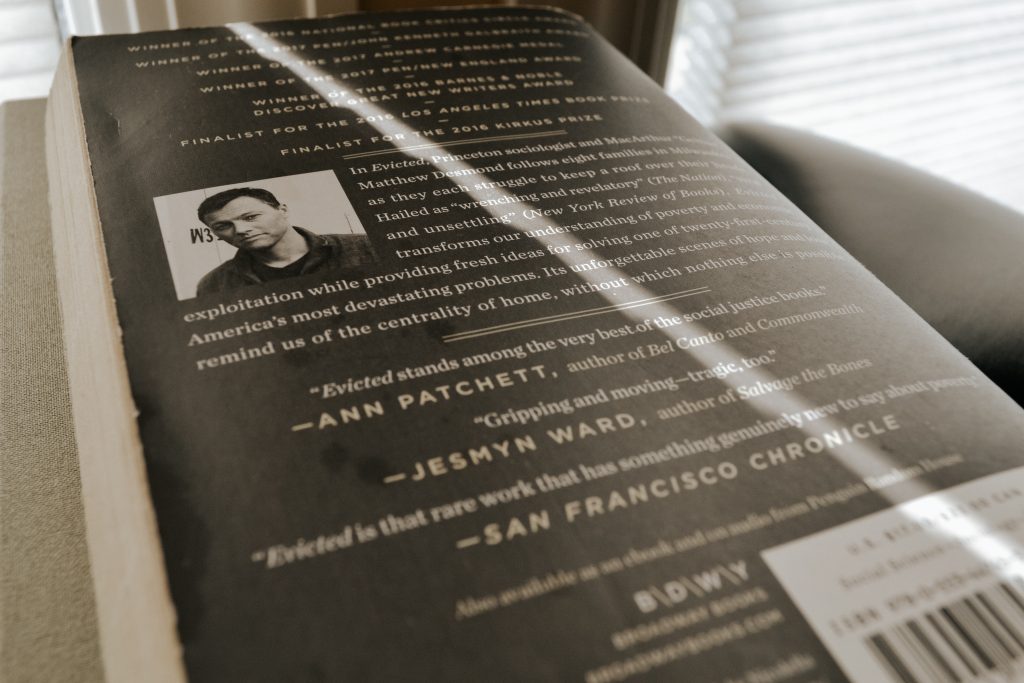“What if the problem of poverty is that it’s profitable to other people?”
Katha Pollitt, The Guardian
It wasn’t until I read Evicted that I began to grasp how deeply I take my concept of home for granted. A Pulitzer Prize-winning exploration of the housing crisis in Milwaukee, Evicted follows eight very different families through one of many threads that unites them: a daily fight to keep a roof over their heads. Researched and written by Princeton sociologist Matthew Desmond, the book reads as both novel and nonfiction. Weaving in and out of different families’ lives, Desmond uses his research on large scale trends in poverty and housing insecurity to situate the rich personal narratives he develops.
The author carefully contextualizes each chapter with important statistics and a working vocabulary of key topics such as Fair Market Rent and Supplemental Security Income (SSI) that affect the characters’ lives. While Evicted exposes the reader to very difficult realities in the lives of real people, Desmond’s dynamic yet grounded writing style makes it an engaging and worthwhile read.
Faces of the Housing Crisis
Before reading Evicted, I thought of poverty as a primarily economic problem: an issue of wealth disparity wrapped up in divergent wages, unemployment, and education levels. Fortunately, Desmond is a sociologist and Evicted is part ethnography, which means that the author immersed himself in the communities and populations he writes about. As part of his fieldwork, Desmond moved into a mobile home park on the South side of Milwaukee for five months before spending another nine months in a rooming house in the inner city. During this time, he didn’t simply hear or observe stories of loss and disruption: he followed them through it, into eviction courts, shelters, homes, and places of work.
This is what makes Evicted so powerful– while it leaves plenty of room for economic and policy-minded discussion, it is primarily a work of storytelling. The detail in which Desmond fleshes out the lives of tenants like Arleen, a young single mother and her two sons, Jori and Jafaris, and the richness with which he conveys the responsibilities and struggles of landlords like Tobin, a 71-year-old mobile home park owner, brings the stories of the people before the cycle of poverty they find themselves in. The narratives are raw, and they bring powerful complexity to an often reductive discourse on poverty.
Cause or Effect?
For those of us fortunate enough to never have experienced the turmoil of daily poverty, eviction may seem like a simple relation of cause and effect: an individual or family is evicted because they are poor, because they have insufficient funds to pay their rent or bills. Evicted quickly disrupts this assumption. Rather than thinking about homelessness and eviction as a simple result of poverty or failure of individual action, Desmond’s emphasizes the complex network of factors that both lead to and emanate from eviction, such as addiction, depression, abusive relationships, death, and discrimination.
Arleen, a single mother living in a tiny apartment with her two young sons, must use 88 percent of her income towards her rent and ration whatever is left for other essentials. When Arleen and her family are repeatedly evicted, they lose their possessions, schools, communities, and sense of dignity. Given Arleen’s eviction record, it’s increasingly difficult for her to find a landlord willing to rent to her, and she calls over eighty prospects before receiving an offer. The family’s next housing arrangement is even more unstable, and the cycle continues.
The story of Ned and Pam, two parents trying to raise their young children in a mobile home park, also emphasizes the role of eviction in perpetuating and increasing poverty. When the family is evicted again, Ned is left with no choice but to skip work to help his family move, causing him to lose his job and the family’s primary source of income. Their situation is complicated by a family predisposition to alcoholism and history of drug abuse.
“Between 2009 and 2011, 1 in 8 Milwaukee renters were involuntarily forced from their homes”
Matthew Desmond, Evicted
Desmond repeatedly emphasizes, however, how the stories of Arleen, Ned, Pam, and others featured in Evicted aren’t specific to Milwaukee. According to his research, at least 1 in 4 families in America dedicate over 70 percent of their income to paying rent and keeping the lights on. As for alternatives, “only 1 in 4 families who qualify for housing assistance receive it”. Desmond does not believe that workable solutions to the housing crisis are outside our collective grasp. Perhaps surprisingly, he argues that the necessary shift is largely one of paradigm. In his words, “decent, affordable housing should be a basic right for everybody in this country. The reason is simple: without stable shelter, everything else falls apart.
Place & Perspective
When I was younger, my sister and I loved watching “House Hunters” on HGTV, often fascinated by the level of thought and detail that new home owners and their agents dedicated to selecting the place they would start their lives together, raise a family, or retire. On the same channel, an online real estate website often aired a commercial that ended with the line, “home isn’t just a place… it’s where life happens”. While their new tagline is, “the house is only half of it”, the sentiment is the same– home is so much more than square footage, a mortgage, or a rent check.
At its core, home is a symbol of authenticity: a place to be yourself, if nowhere else. Maybe it’s the unwavering role of home as a given, as the one place we can always return to, that makes it so easy to take for granted. Now more than ever, as many of us are “stuck at home”, I am reminded of the struggles presented by persistent eviction, and the privilege it is to have a place called home. Desmond’s articulation of the national housing crisis and his broader discussion of poverty and causality genuinely engaged me with experiences and perspectives I have seldom encountered. As a critical starting point for many of the ongoing dialogues surrounding economic and social inequality, I highly recommend Evicted.

- Activism, Meet Impact: Erika on GameStop, Hacktivism and Empathy - February 8, 2021
- Innovative is not Progressive: What Technology Means to Activists - January 5, 2021
- Hacktivism: Resistance from Digital Gabon - December 8, 2020
